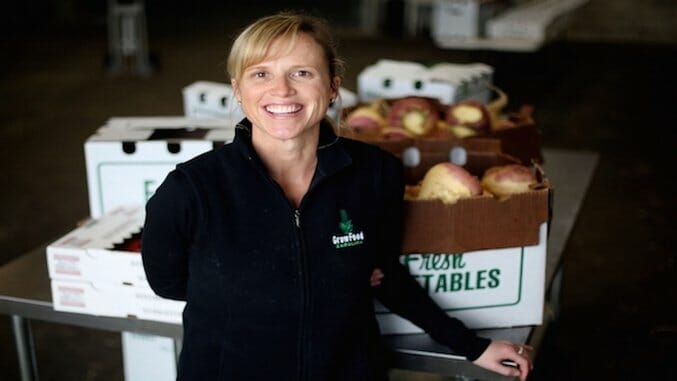Sara Clow on Growing a Food Hub in South Carolina
Photos courtesy of GrowFood Carolina Food Features South Carolina
This time of year, the GrowFood Carolina warehouse in Charleston, S.C., is hot. The door is open wide to a gravel parking lot and train tracks beyond, and in the mornings, farmers pull up from all over the region, having loaded up their produce or foodstuffs even earlier in the day in communities such as Johns Island, Nesmith, McClellanville or Georgetown. Much of the rainbow hues of produce go straight into huge coolers to await delivery to more than a hundred different outlets, many of which are the fancy restaurants of Charleston you read about in almost any publication these days.
The staff of GrowFood Carolina constantly buzzes with activity: fielding phone calls, checking
invoices, answering questions from chefs and coordinating deliveries. This is South Carolina’s first food hub, and Sara Clow is its general manager. Paste sat down with this unsung hero of a revitalizing food system to understand the process.
Paste: How did you get involved with GrowFood Carolina?
Sara Clow: I was recruited by the Coastal Conservation League to helm this new arm of their food and agriculture program. Lisa Turanksy, now the Chief Conservation Officer for the League, had laid a lot of the groundwork, and so I was brought into get things up and running.
Paste: How do you work with farmers?
Sara Clow: We have a couple of phone calls and tell them how the model works. If it sounds like we can all work together, then we go out for a visit. We won’t sell produce for a farm we haven’t visited. It’s really important to create a relationship with the farmer because we work with these growers to align supply with demand, to come up with a crop production plan, and we do sales/marketing, and distribution for them. And we communicate with them a lot so that they understand the market.
Paste: Besides the obvious (food), why is it so important to the League that the farmers succeed?
Sara Clow: We work with farmers so that they can remain or become all the things that sustainable means, and that definitely includes financially. Farmers who are able to be financially sustainable will keep farming, they will stay on their land. And so the land will remain part of the critical productive landscape.
 Photo courtesy of GrowFood Carolina
Photo courtesy of GrowFood Carolina
Paste: Why is this so hard for us as a society currently? So many farmers are leaving farming. What is not working for them?
Sara Clow: We have lost value in our food system. I always use the dollar menu at McDonald’s as an example. Who is getting that $1.00? The meat producer? The farm who is growing the grain for the buns? The tomato farmer that grows the tomatoes for ketchup? It’s impossible. We are working to really put value back into the food system. We have a single-source ID system, which means the name of the farmer goes on everything we do. Buyers who appreciate that connection make better choices.
Paste: What is the biggest reward from your work?
Sara Clow: Well, I really have two. First, the team is amazing. I have no idea what karmic things I did to deserve these smart, hardworking, passionate people who share the vision. I was the only full-time employee when we opened the doors, and we now have eight full-time employees, and they’re all exceptional.
 Photo by Christopher Shane
Photo by Christopher Shane
And secondly, when we opened the doors, we had five farmers that first week. Now we work
with 80 producers, and the majority of that growth is through word of mouth — farmer to farmer. That is the greatest compliment we could ever receive.
Stephanie Burt is a contributor for Paste based in Charleston, S.C. who travels to eat
and look at art and architecture until she’s hungry again. You can find her on Twitter
or Instagram at @beehivesteph or listen to her distinctive Southern accent weekly on
her podcast The Southern Fork.